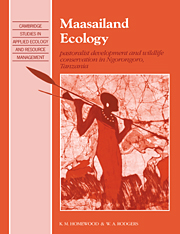Book contents
- Frontmatter
- Contents
- Preface
- 1 Management problems and applied ecology in Ngorongoro Conservation Area
- 2 Ngorongoro Conservation Area
- 3 Maasai of Ngorongoro
- 4 History, politics and perceptions in Ngorongoro
- 5 Management-oriented research in NCA
- 6 Range resources
- 7 Wildlife
- 8 Livestock ecology
- 9 Livestock and wildlife
- 10 Maasai ecology: development, demography and subsistence
- 11 Wildlife conservation and pastoralist development
- 12 Development interventions
- 13 Viewpoint
- References
- Author index
- Subject index
- Map: Ngorongoro Conservation Area, showing the main features and place names used in the text
Preface
Published online by Cambridge University Press: 08 February 2010
- Frontmatter
- Contents
- Preface
- 1 Management problems and applied ecology in Ngorongoro Conservation Area
- 2 Ngorongoro Conservation Area
- 3 Maasai of Ngorongoro
- 4 History, politics and perceptions in Ngorongoro
- 5 Management-oriented research in NCA
- 6 Range resources
- 7 Wildlife
- 8 Livestock ecology
- 9 Livestock and wildlife
- 10 Maasai ecology: development, demography and subsistence
- 11 Wildlife conservation and pastoralist development
- 12 Development interventions
- 13 Viewpoint
- References
- Author index
- Subject index
- Map: Ngorongoro Conservation Area, showing the main features and place names used in the text
Summary
Metolu lung' elukunya nabo engeno One head does not complete the wisdom
(Many heads are better than one – Maasai saying)Applied research in the field of natural resource management must integrate science with the complex issues of economics, politics, and human rights. These are bound up with cultural values that lead to subjective viewpoints, dogma and prejudice, which can influence policy more than does ecological fact.
This book grew from our ecological research on pastoralism in a joint wildlife/human land use area. The management in Ngorongoro Conservation Area in northern Tanzania have for decades perceived a conflict between wildlife values and pastoralist activities. By 1980 the conflict was seen as severe enough to warrant expulsion of the pastoralists, but the Ngorongoro Conservation Area Authority needed objective documentation to back up action. UNESCO was to fund a management plan and we were commissioned to produce background information on the ecological facts. Our input was expected to be a standard environmental impact assessment: In what way do pastoralists affect the wildlife? Is this a major problem? If so, recommend pastoralist relocation.
The reality turned out to be more complex. The wildlife community is held to be one of the modern wonders of the world, and the Maasai are arguably the best known of Africa's pastoralist peoples. They have coexisted successfully for centuries. UNESCO acknowledged the importance of both, as well as of their interaction, in declaring Ngorongoro Conservation Area a World Heritage Site and a Man and Biosphere Reserve.
- Type
- Chapter
- Information
- Maasailand EcologyPastoralist Development and Wildlife Conservation in Ngorongoro, Tanzania, pp. xi - xviPublisher: Cambridge University PressPrint publication year: 1991



